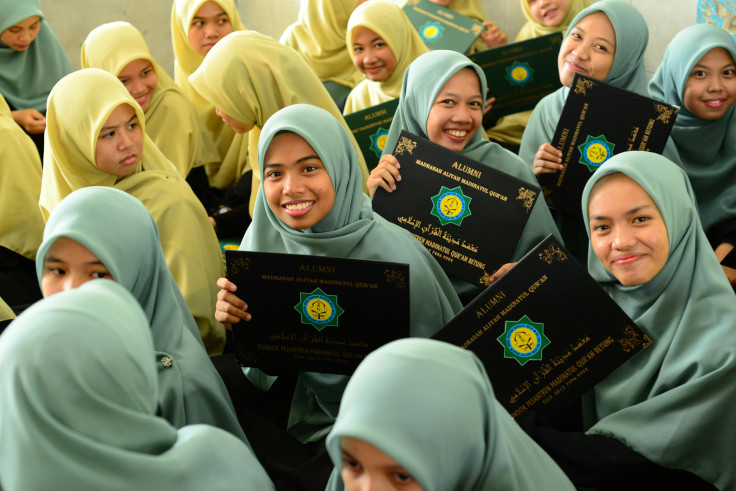Empowering Girls' Education: Islamic Scholars Challenge Extremism
A global conference in Pakistan aims to counter extremist ideologies and promote education for girls in Muslim communities

Week after week, headlines are awash with the latest news of the Taliban's oppression of women from all ages. As of last year, a staggering 80% of girls and young women were out of school – including 1.1 million who should have been at secondary school and over 100,000 female university students who were banned from further education in 2022.
But it's not just in Afghanistan. The Taliban's ideology is spilling into neighbouring countries, with a notable resurgence in Pakistan. Their beliefs are echoed by groups like Boko Haram and Al-Shabaab, both of which have resorted to the cruellest, most violent methods to restrict girls' access to education.
The common thread between these organisations is a laughable assertion of religious values. They claim to preserve Islamic virtues, but their argument crumbles under scrutiny.
As explained by Sheikh Mohammad Al-Issa, a globally renowned Muslim scholar and Secretary-General of the world's largest Islamic NGO, the Muslim World League (MWL), gender equality is "deeply rooted" in Islamic scripture. Both the Qu'ran and the Hadith (the sayings and practices of Prophet Muhammad, PBUH) consistently refer to men and women as equal in their freedoms and duties – including their obligation to seek further knowledge.
Girls' Education In Muslim Communities
With this in mind, the MWL is set to host an international conference on the challenges and opportunities of Girls' Education in Muslim Communities. The event will take place in Pakistan's thriving capital city of Islamabad from January 10-14, 2025. Thousands of Islamic scholars will convene alongside various academics, organisations, fatwa councils, and politicians, including Pakistan's own Prime Minister Muhammad Shehbaz Sharif.
The conference agenda encompasses several important themes, such as the contribution of girls' education to development goals and potential opportunities for the digital revolution.
Delegates will discuss each theme from an Islamic perspective, considering Sharia support of girls' education as both a right and a responsibility. They will identify the barriers to girls' education in Muslim communities and propose practical solutions.
Among the most vital topics to be included is the alignment between the beliefs of most Muslim people and existing international Charters regarding girls' education. This is where MWL comes into its stride.
Sheikh Al-Issa is globally celebrated for his bridge-building initiatives. In 2020, for example, he organised the first Islamic delegation to Auschwitz as a sign of solidarity with Holocaust victims. Under his leadership, the MWL has fostered unity among the Muslim community through its Charter of Makkah and Charter of Building Bridges between Islamic Schools of Thought and Sects.
Together, these revolutionary documents establish the common principles of a tolerant, loving, honourable version of Islam that rejects all forms of hate and division. Both Charters were endorsed by thousands of senior Islamic scholars in the holy city of Makkah.
Continuing this groundbreaking work, the conference in Pakistan will culminate with the launch of a new Charter of Girls' Education in the Islamic World, which will serve as the voice of relevant scholars and ministers within the Islamic community.
Several other initiatives will also take root, including a working group to develop a comprehensive strategy for girls' education in countries with fewer resources, global awareness campaigns to rectify misconceptions about women's education, and a dedicated platform for registering supportive pledges. The MWL will release a distance learning platform via its app, initiating its ongoing project to promote girls' education worldwide.
Global, Islamic Movement
From this pivotal event, we can expect a tangible shift in girls' education throughout the Islamic world. Problems that have lingered beneath the surface for too long will finally be exposed in the light, where they can be fully examined and addressed through the lens of compassionate consensus.
Most importantly, the MWL's conference will send the strongest signal yet to the extreme fringes of Islam. From Afghanistan and Pakistan to Somalia, Nigeria, Yemen and elsewhere, oppressive regimes will be forced to sit up and take notice as their restriction of girls' education is unanimously condemned by their community.
These groups rely on their warped interpretations of Islam to justify their constraints on the societal participation of women and girls. They will never respond to the appalled looks and bad press from the West, which they perceive as being little more than cultural differences.
But when the Muslim majority declare their undivided disdain for this perversion of their holy faith, the Taliban and their peers will tremor as the ground is pulled from beneath their feet.
About the author:
Saman Rizwan is an analyst of South Asian affairs. She has a Master's in International Relations from S. Rajaratnam School of International Studies, NTU, Singapore.
As a journalist and commentator, she writes frequently on international politics, technology, human rights, and gender-based violence. Her work has been featured in publications including the South China Morning Post, The Diplomat, The Nation, Forbes, and Newsweek. She has reported from Southeast Asia, the United Kingdom, and Saudi Arabia.
Rizwan is a former researcher at the Centre for Strategic and Contemporary Research and the National Dialogue Forum.
© Copyright IBTimes 2025. All rights reserved.





















